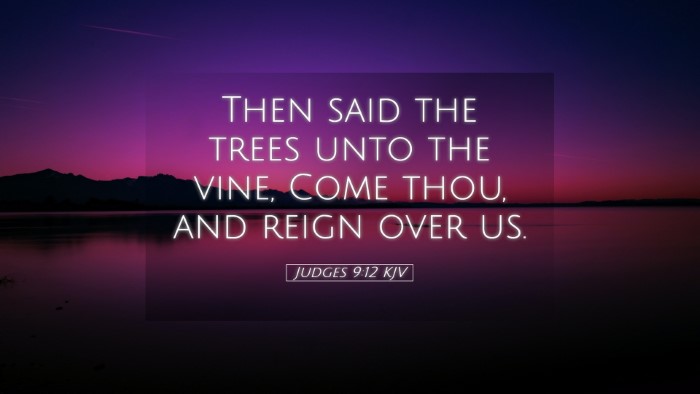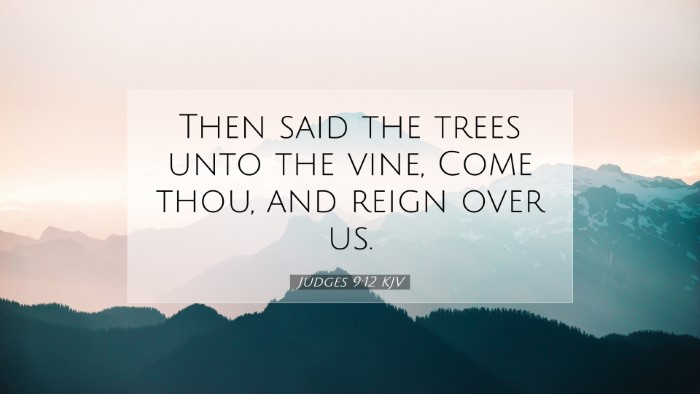Commentary on Judges 9:12
Verse Context: Judges 9:12 records part of the fable of Jotham, where he compares the appeals of various trees seeking a king. This verse is part of his prophetic warning against Abimelech, who had usurped power after the death of his father, Gideon.
Summary of Public Domain Commentaries
Matthew Henry's Commentary
Matthew Henry provides an insightful analysis of the metaphorical language found in this passage. He emphasizes the role of fruit-bearing trees as a symbol of productivity and purpose. In Judges 9:12, the trees' inquiry regarding a king suggests their desire for governance and order to enhance their fruitfulness:
- Symbolism of Trees: Henry points out that trees represent the ministers of God who are tasked with spiritual governance over the people.
- Importance of Leadership: He underlines that leadership should be chosen wisely, as a good ruler will cultivate prosperity and peace among the "trees" or the people.
Albert Barnes' Notes on the Bible
Albert Barnes further elaborates on the dynamics of the dialogue among the trees. He highlights the democratic aspect of their quest and notes:
- Connotation of Choice: Barnes asserts that the trees' search for a king illustrates the necessity of divine selection in leadership. The trees’ decision-making process is crucial to ensure that the chosen leader promotes the common good.
- Contrast with Abimelech's Rule: This commentary starkly contrasts the righteous rule God desires with the tyranny illustrated through Abimelech's reign. The trees' yearning for a benevolent king foreshadows the people's suffering under poor leadership.
Adam Clarke's Commentary
Adam Clarke brings a unique perspective, focusing on the allegorical significance of the trees' request. He notes that the trees symbolize various leaders who strive for power:
- Allegorical Interpretation: Clarke interprets the trees as nations or people groups, indicating a collective desire for righteous leadership. This not only reflects human nature's yearning for governance but also the expectations of what that leadership should entail.
- Leadership Qualities: He urges a consideration of the attributes necessary for a leader, such as wisdom and the ability to nurture. Clarke stresses that true leadership arises not from force but from the ability to uplift and guide the community towards a fruitful existence.
Theological Applications
The insights gathered from these commentators prompt several theological reflections pertinent to pastors and scholars today:
- The Need for Righteous Leadership: Just as the trees yearned for a king, congregations today must seek leaders who exhibit Christ-like qualities—humility, service, and stewardship.
- Criteria for Selection: The safety and health of both spiritual and societal communities depend heavily on the discernment in selecting leaders. This can be likened to the biblical principle of seeking wise counsel (Proverbs 15:22).
- Remembering the Consequences: The impending warning against Abimelech urges us to consider the implications of leadership failure, underscoring the importance of aligning values with God’s intentions for leadership.
- Function of Leadership: Effective leadership should aspire to bring forth fruitfulness among the people, guiding them towards a deeper relationship with God.
- Understanding Our Role: The passage elaborates on the communal aspect of governance; it encourages both leaders and constituents to engage actively in the life of the community.
Conclusion
In conclusion, Judges 9:12 serves as a poignant reminder of the types of leaders we seek in both church and society. Reflecting on the insights provided by Matthew Henry, Albert Barnes, and Adam Clarke, we are challenged to seek leaders who will nourish the spiritual and communal life akin to fruitful trees. This text not only warns against the dangers of tyrannical leadership but also illuminates the characteristics that should define righteous governance—a pursuit that remains ever pertinent in our contemporary context.


